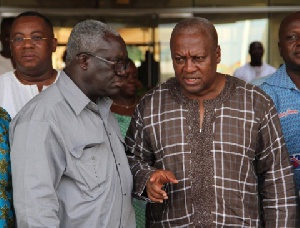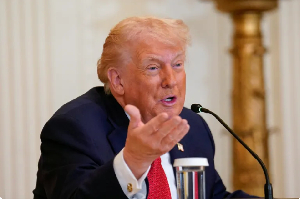The Trades Union Congress (TUC) has called on government to convene a meeting of the National Tripartite Committee to discuss the TUC's proposal for upward adjustment of the Daily Minimum Wage without any further delay.
The TUC says: "Given the hardship facing the working people of the country, it is unthinkable that government can even contemplate a wage freeze in the public sector."
The Union believes once consultation on the national minimum wage is concluded, the negotiation for review of the base pay and relativity on the Single Spine Salary Structure will commence.
"A significant upward adjustment of wages is required to cushion workers from the current economic hardship. Workers of Ghana have been stretched to the limit; we cannot contain any further burden imposed on workers due to economic mismanagement," the TUC proffered.
These and other pertinent economic discussions formed the basis of a statement released to all media houses on the general economic situation in the country.
The TUC noted in the statement that since 2005, the Union and civil society organisations have made annual submissions on the economic and social policies for consideration of the Minister of Finance and Economic Planning in the annual budget statement.
"At the heart of all our submissions has been the call for a national dialogue and consensus building on the nature of an economic policy and economic management that can create employment and reduce poverty which has afflicted millions of Ghanaians."
However, the TUC says managers of the economy have chosen to ignore their advice and other brilliant suggestions put forward by civil society.
It accuses government of relying on advice from the International Monetary Fund and the World Bank. Thus in the last three decades, the Union says, economic policy has been heavy neo-liberal in character: privatisation of strategic national assets, unbridled liberalisation of international trade, and the ruthless deployment of market forces as evidenced by the removal of subsidies on utilities and fuel.
"These bad economic policy choices have been exacerbated by pervasive corruption, cronyism, incompetence, and extreme partisanship," the statement stated.
The Union says views are converging that the economy is failing or has failed, and that times are really hard for Ghanaians. The statement further went on to say that out of desperation, government has now resorted to increases in VAT -- which is a well-known regressive form of taxation.
On the issue of the local currency’s sliding value, the Union puts the blame squarely on the policy of unbridled trade liberalization -- or more appropriately, import liberalisation -- which has compelled the nation to virtually live on imports.
"Our increasing appetite for imports means that our demand for foreign currency, particularly the US dollar, is growing exponentially."
The problem, it notes, has been compounded by the over-liberalisation of our external payment system; thus allowing for transfer of foreign currency of any amounts out of the country by foreign companies operating in Ghana.
The TUC shares the view that dollarisation of the economy is partly to blame for the current messy situation, but it equally accuses government of being most guilty since state agencies like the Tema Development Corporation sell land at dollar-indexed prices.
These and a raft of other anomalies cited by the Union account for the situation the economy finds itself in today. The Union agrees that there is no easy solution to the current situation, but believes the country requires immediate short-term remedial measures to ameliorate the plight of Ghanaians.
First, it wants government to roll-back some of the taxes; second, government must re-introduce subsidies on utilities and fuel, and rid government machinery of corruption and corrupt elements.
Business News of Friday, 7 February 2014
Source: B&FT













